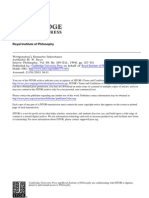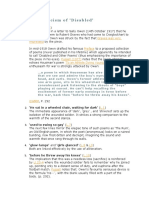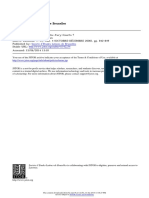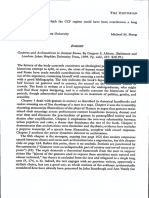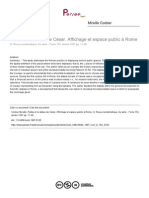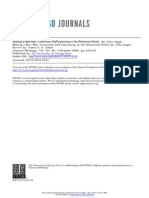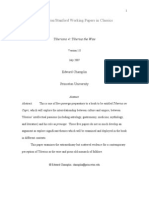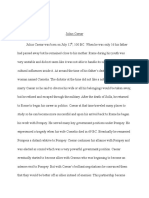KEITEL-2018-Cicero Overliver PDF
KEITEL-2018-Cicero Overliver PDF
Uploaded by
Florencia GabrielaCopyright:
Available Formats
KEITEL-2018-Cicero Overliver PDF
KEITEL-2018-Cicero Overliver PDF
Uploaded by
Florencia GabrielaOriginal Title
Copyright
Available Formats
Share this document
Did you find this document useful?
Is this content inappropriate?
Copyright:
Available Formats
KEITEL-2018-Cicero Overliver PDF
KEITEL-2018-Cicero Overliver PDF
Uploaded by
Florencia GabrielaCopyright:
Available Formats
CICERO AS OVERLIVER
ELIZABETH KEITEL
Abstract: Aside from his actual exile, Cicero describes himself as an exile and overliver in two other stressful
periods: during the civil war of 49 and during life at Rome under Caesar’s autocracy. Scholars have long noted
the exile imagery in Cicero’s letters of 46–45, but not in those of 49. Also unnoticed is the image of the overliver,
well known from epic and tragedy, who, shamed by a single event, feels he has lived too long yet cannot escape
life. In the first two periods, Cicero also deftly employs the themes and figures of lamentation to underline his
distress and his liminal state as an overliver and to rebut Atticus’ criticism of his self-pity. This self-presentation,
sustained over three lengthy and traumatic episodes of Cicero’s life, contrasts with his occasional assumption of
literary exempla for his own behaviour.
Scholars have described various periods in Cicero’s life as an exile.1 But aside from his
exile of 58–57 bc, Cicero only characterizes two other periods in this way: the outbreak of
civil war in the spring of 49 and Caesar’s autocracy at Rome in 46–45. Not coincidentally,
he describes his life during all three periods as a kind of living death. In this paper, I will
explore why Cicero conceives of his experiences during these periods in this way and how
he makes nuanced distinctions between these unhappy periods through his use of the tropes
of overliving and lamentation. While blaming himself for bad judgement at various points
in his life, such as during his enforced sojourn at Brundisium in 48/47, he reserves the
tropes of overliving for the periods examined here.
Cicero presents himself in the letters as an overliver, that is, one who lives beyond one’s
proper date or time of action; one who lives too long. Cicero draws on epic and tragedy for
this characterization. Emily Wilson characterizes this type as one who experiences a feeling
of endless repetition as his life goes on and on without hope of an end. Death, including
suicide, is not a solution for the overliver, who often senses no distinction between life and
death: ‘once a character has lived too long, any death must come too late’.2 This type also
sees no end to a sense of shame and guilt.3
Survivors and overlivers are natural lamenters. James Chong-Gossard succinctly defines
lamentation as ‘the acting out of grief which elicits consolation’.4 As Margaret Alexiou
has demonstrated, the themes and tropes of Greek ritual lamentation remain remarkably
consistent in both life and literature for many centuries.5 When thinking about lamentation
in the letters of these periods, we should note Livy’s astringent comment in his obituary of
Cicero, as reported by Seneca, that during a long run of success he was: ‘at times struck
by great wounds, exile, the collapse of the party for which he had stood, the death of his
1
See Claassen 1999:16. Herescu (1961) discusses two other ‘exiles’: the governorship of Cilicia and the internal
one under Caesar at Rome. The letters are quoted from Shackleton Bailey 1965–1970, 1977, and 1980, and the
translations are my own unless noted otherwise.
2
E. R. Wilson 2004: 6.
3
E. R. Wilson 2004: 1–23.
4
Chong-Gossard 2013: 45.
5
Alexiou 2002. The themes and rhetorical devices common in lament were sufficiently well known that they
provoked parody by Aristophanes (Ran. 1331–55) and Lucian (Luct. 13). See Alexiou 2002: 139–40 and 151.
BICS-61-2 2018 22
© 2018 Institute of Classical Studies University of London
ELIZABETH KEITEL: CICERO AS OVERLIVER 23
daughter and his own grim and bitter end. Yet he bore none of his many misfortunes, except
his violent death, like a man’.6 We shall see in the letters how Cicero reacts to similar
criticisms from Atticus, yet goes on lamenting.
I. Exile
Given that the Romans equated exile with at the very least a civil death, it is not surprising
that Cicero’s letters from exile are replete with images of overliving and living death.7 As
in epic or tragedy, Cicero’s overliving is not the result of a gradual, natural decline but of a
single sharply defined event.8 In his letters from exile, Cicero vacillates between portraying
himself as a survivor and an overliver. He variously describes himself as the same man he
was, or as having lost his sense of self (Att. 3.15.2 = SB 60):9
nam ceteri dolores mitigantur vetustate, hic non potest non et sensu praesentis
miseriae et recordatione praeteritae vitae cottidie augeri. desidero enim non mea
solum neque meos sed me ipsum. quid enim sum?
Other griefs are softened by time, but this can only increase every day from the sense
of present distress and the recollection of the life that is past. I miss not only the
things and people that were mine, but my very self. What am I now?
He repeatedly asserts or implies that he would prefer not to go on living (Att. 3.19.1–2 = SB
64), though he assures Atticus that he is not suicidal.10 He does remark, though, that Atticus’
exhortation to live is only partially effective (Att. 3.7.2 = SB 52): ‘quod me ad vitam vocas,
unum efficis ut a me manus abstineam, alterum non potes ut me non nostri consili vitaeque
paeniteat’ — ‘As to your calling me to life, you bring about one thing, that I keep my hands
off myself, but you cannot bring about the other request, that I not regret your advice and
my life.’11
Like the overliver of tragedy and epic, Cicero finds himself in no man’s land because
he did not die at the kairos (Att. 3.7.2 = SB 52): ‘cuius oppetendae tempus honestissimum
praetermissum est; reliqua tempora sunt non iam ad medicinam sed ad finem doloris’ —
‘the most honourable time for meeting death has passed by. The remaining time is no longer
6
Sen. Suas. 6.22: ‘interim ictus vulneribus, exilio, ruina partium pro quibus steterat, filiae morte, exitu tam tristi
atque acerbo, omnium adversorum nihil ut viro dignum erat tulit praeter mortem’. For male singers of lament, see
Suter 2008: 156–80.
7
For exile as a civil death, see Gaius Inst. 3.153 and Wistrand 1968: 9–25. For exile as death in Cicero, see also
Doblhofer 1987: 166–78; Degl’Innocenti Pierini 1996: 11–13; Hutchinson 1998: 26; and Beard 2002: 126–27.
8
E. R. Wilson 2004: 3.
9
For Cicero’s anti-consolatio in the exile letters, see Claassen 1999: 83–85; and Degl’Innocenti Pierini 1996:
15–21. Cicero, like a tragic hero, paints his situation as extreme and unique. See Degl’Innocenti Pierini 1996:
18–19. See also Att. 3.5 = SB 50, and Fam. 14.1.3 = SB 8: ‘quem ego diem si videro et si in vestrum complexum
venero ac si et vos et me ipsum reciperaro, satis magnum mihi fructum videbor percepisse et vestrae pietatis et
meae’ — ‘If I see that day, and if I come into the embrace of you all, and if I recover both you and myself, I will
seem to have reaped a great reward for both your devotion and mine.’
10
Cicero hints at suicide elsewhere during his exile if the hope of his return is not realized (Fam. 5.4.2 = SB 10;
Fam. 14.3.5 = SB 9; and Att. 3.23.5 = SB 68), or if he is no longer of use to his brother (QFr. 1.3.5 and 6 = SB 3;
QFr. 1.4.5 = SB 5). Did Cicero mean this seriously? Cf. Hutchinson 1998: 45.
11
Cf. Att. 3.3 = SB 47 and Att. 3.9.1 = SB 54.
© 2018 Institute of Classical Studies University of London
24 BICS-61-2 2018
used for a remedy but for an end to pain’.12 He expresses a similar sentiment to his brother
Quintus (QFr. 1.3.6 = SB 3): ‘scio fuisse et honestius moriendi tempus et utilius. sed non
hoc solum, multa alia praetermisi’ — ‘I know there was a time more useful and honorable
to die, but I let not only this one slip but many others’.13
When explaining to his brother why he has not met him in Greece, Cicero writes, ‘you
would have seen not even a trace of him [i.e. himself], nor a likeness, but as it were an
image of a dead man still breathing’ (‘spirantis mortui’).14 So the chorus in Antigone calls
the man who has lost all happiness ‘a living corpse’ (Soph. Ant. 1167), and Philoctetes
describes himself being cast off on Lemnos as ‘without friends or comrades or city, a dead
man among the living’ (Soph. Phil. 1018). Conversely, Cicero describes his restoration as
‘a sort of beginning of a second life’, and ‘the birthday of his return’.15
Let us turn now to lamentation. In the Tusculans Cicero will chastise men who cry out
in pain and lamentation as unmanly (Tusc. 2.31–33). Yet the Cicero of 58 resents Atticus’
repeated scolding of him (‘objurgare’) for lacking a ‘firmus animus’ (Att. 3.10.2 and 3 = SB
55). 16 Cicero rebuts such criticism while explaining why he did not meet his brother who
was returning from his governorship of Asia (Att. 3.10.2):
Seeing that you rebuke me so often and so vigorously, and tell me I am lacking in
resolution, I ask you whether there is any evil so great that it is not in this disaster of
mine. Has anyone ever fallen from so distinguished a position, in so good a cause,
with such great resources of talent, judgment, and influence, and in the support of all
honest men? Can I forget what I was? Can I not feel what I am and what I lack —
what rank, what distinction, what children, what fortune, what brother? As for him,
you should note this new kind of disaster: loving him more than myself as I ever
have done, I avoided meeting him so I either would not see him in the grief and dress
of mourning nor yet present myself, whom he had left flourishing — a shattered and
ruined man. I pass over the other intolerable things, for I am hindered by weeping.17
While not saying he is lamenting, Cicero employs familiar tropes and rhetorical devices
of that genre. He rebuts Atticus’ criticism with a series of rhetorical questions replete with
anaphora and polyptoton, which contrast what he was with what he has now become.18 He
writes this, he says, so that Atticus can lighten Cicero’s burden rather than think him worthy
of rebuke (Att. 3.10.3 = SB 55). Thus Cicero uses the forms of lament both to scold Atticus
12
For time and the overliver, see Wilson 2004: 8.
13
Cf. Fam. 14.4.6 = SB 6.
14
QFr. 1.3.1 = SB 3; trans. Hutchinson 1998: 42.
15
Att. 4.1.8 = SB 73: ‘alterius vitae quoddam initium ordimur’; Att. 3.20.1 = SB 65: ‘diemque natalem reditus
mei’.
16
Cf. Att. 3.11.2 = SB 56, Att. 3.13.2 = SB 59, and Att. 3.15.1; 7 = SB 60.
17
Att. 3.10.2 = SB 55: ‘nam quod me tam saepe et tam vehementer obiurgas et animo infirmo esse dicis, quaeso,
ecquod tantum malum est quod in mea calamitate non sit? ecquis umquam tam ex amplo statu, tam in bona
causa, tantis facultatibus ingeni, consili, gratiae, tantis praesidiis bonorum omnium concidit? possum oblivisci
qui fuerim? non sentire qui sim, quo caream honore, qua gloria, quibus liberis, quibus fortunis, quo fratre? quem
ego, ut novum calamitatis genus attendas, cum pluris facerem quam me ipsum semperque fecissem, vitavi ne
viderem, ne aut illius luctum squaloremque adspicerem aut ne me, quem ille florentissimum reliquerat, perditum
illi adflictumque offerrem. mitto cetera intolerabilia; etenim fletu impedior.’
18
For the then/now contrast in lament, see Alexiou 2002: 165–71. On polyptoton in lament, see Alexiou 2002:
151 and Wright 1986: 13.
© 2018 Institute of Classical Studies University of London
ELIZABETH KEITEL: CICERO AS OVERLIVER 25
and appeal for sympathy.
Cicero continues in the role of the lamenting overliver in QFr. 1.3 (= SB 3) when he
explains to his brother why he did not meet him in Greece. Instead, Marcus sent slaves to
tell Quintus not to expect him, followed by a letter to the same effect. Cicero uses the topoi
and figures from lamentation to underline his self-portrayal as a living dead man and to
elicit pity for his state from his brother (QFr. 1.3.1):
My brother, my brother, my brother! Were you really afraid that I was angry at you
for some reason and on that account sent boys to you without a letter, or even did
not want to see you? I angry with you? How could I be? As though it was you who
struck me down, your enemies, your unpopularity, and not I who have lamentably
caused your downfall? That much-lauded consulship of mine has robbed me of you,
and my children, and my country, and my possessions; I only hope it has robbed you
of nothing but myself. Sure it is that you have never given me cause for anything but
cause for pride and pleasure, whereas I have brought you sorrow for my calamity,
fear of your own, loss, grief, loneliness. I not want to see you? No, it was rather that
I did not want to be seen by you! You would not have seen your brother, the man
you left in Rome, the man you knew, the man who saw you off and said goodbye
with mutual tears — you would not have seen any trace or shadow of him; only the
likeness of a breathing corpse. Would that you had seen me or heard of me dead
before this happened! Would that I had left you as the survivor not of my life only
but of my standing!19
In this section, Cicero takes on the role of the solitary mourner, a familiar figure from
Greek tragedy, ‘isolated from friends and society’, who laments his own losses (Wright
1986: 119). So Creon and Oedipus each lament the ruin he has caused or is causing his
family (Soph. Ant. 1261–1346; OT 1302–1366).20 Each is also an overliver (OT 1354–55;
Ant. 1288 and 1325). Cicero’s situation is similar: he bitterly regrets both being alive and
the harm he has inadvertently done to Quintus by choosing to live. For the sake of Quintus,
he chose life over death (QFr. 1.3.2): ‘quod omnes in mea vita partem aliquam tuae vitae
repositam esse dicebant’ — ‘because everyone said that some part of your life rested in
mine’, though he now realizes his mistake. Had he died, he could not be blamed, as he is
now, for failing to help Quintus. Now his voice, which had defended strangers, cannot help
his brother (QFr. 1.3.2).21
19
Trans. Shackleton Bailey 2002. QFr. 1.3.1 = SB 3: ‘mi, frater, mi frater, mi frater, tune id veritus es ne ego
iracundia aliqua adductus pueros ad te sine litteris miserim aut etiam ne te videre noluerim? ego tibi irascerer? tibi
ego possem irasci? scilicet; tu enim me adflixisti, tui me inimici, tua me invidia ac non ego te misere perdidi. meus
ille laudatus consulatus mihi te, liberos, patriam, fortunas, tibi velim ne quid eripuerit praeter unum me. sed certe
a te mihi omnia semper honesta et iucunda ceciderunt, a me tibi luctus meae calamitatis, metus tuae, desiderium,
maeror, solitudo. ego te videre noluerim? immo vero me a te videri nolui. non enim vidisses fratrem tuum, non
eum quem reliqueras, non eum quem noras, non eum quem flens flentem, prosequentem proficiscens dimiseras, ne
vestigium quidem eius nec simulacrum sed quandam effigiem spirantis mortui. atque utinam me mortuum prius
vidisses aut audisses, utinam te non solum vitae sed etiam dignitatis meae superstitem reliquissem.’ Hutchinson
(1998: 47) sees ‘feeding the pity’ of Quintus as one of Cicero’s persuasive objects in this letter.
20
On this see also Wright 1986: 118–19.
21
Cicero alludes here and at QFr. 1.3.2; 4 to his fear that Quintus may face prosecution for crimes he allegedly
committed while he was governor.
© 2018 Institute of Classical Studies University of London
26 BICS-61-2 2018
Cicero applies the tropes of one lamenting the dead to his own continued existence in
order to underline his liminal state: expressions of grief for the pain he has caused (QFr.
1.3.1); past versus present (QFr. 1.3.1); the desire to die (QFr. 1.3.1); and his anger at
those responsible for the death (QFr. 1.3.5).22 Cicero expresses these themes with the stock
devices of lamentation: direct address (though here to a living person) in a most unusual
triplication,23 and a series of questions with anaphora and polyptoton. Most striking is
Cicero’s use of the I/you formula in which normally the mourner contrasts himself with the
mourned, but which Cicero neatly inverts so that the ‘deceased’ mourns the survivor. Cicero
also varies the formula by the insistent interlocking of I/you and yours/mine, which suggests
his love and concern for his brother.24 Even at a distance, Cicero holds Quintus tight. Only at
the end of QFr. 1.3.1 (‘atque utinam […] reliquissem!’) does Cicero separate the pronouns
when he describes what ought to have happened: his death and Quintus’ survival.
II. Civil War
Let us turn now to the spring of 49 bc, when the outbreak of civil war created for Cicero a
perfect storm of anxieties that he shared with Atticus as he agonized over what to do. Cicero
stays mostly at Formiae, never going to Rome. He is deeply concerned about the safety of his
family and of course about his own reputation. He knows that some at Rome are criticizing
him for not joining Pompey (Att. 9.1.3 = SB 167; 9.2a.3 = SB 169). Behind all this lies the
spectre of another exile.25 In January, Atticus had expressed his concern that Cicero might
be exiled again, as Cicero recalls in a letter of 18 March, in which he recapitulates the twists
and turns in events and in Atticus’ advice. So on 23 January Atticus had written (Att. 9.10.4
= SB 177): ‘sed venio ad consultationem tuam. si Gnaeus Italia cedit, in urbem redeundum
puto; quae enim finis peregrinationis?’ — ‘but I come to your problem: if Gnaeus withdraws
from Italy I think you should return to Rome. What will be the end of your travel?’. This
sank deep into Cicero’s mind as he spotted ‘travel’ as a euphemism for ‘miserable exile’.
Cicero elsewhere writes that he is reluctant to follow Pompey for, among other reasons, ‘it
is difficult to think about a voluntary departure without any hope of return’ (Att. 9.13.4 =
SB 180).26
When he thinks Pompey has left Brundisium, Cicero starts describing his own situation
as overliving. Once again, these images are triggered by a single event by which Cicero
feels shamed. So he writes to Atticus on 18 March (Att. 9.10.2 = SB 177): ‘me una haec res
torquet quod non omnibus in rebus labentem vel potius ruentem Pompeium tamquam unus
manipularis secutus sim’ — ‘this one thing tortures me, that I have not followed Pompey
like a common soldier while he’s slipping or rather rushing to disaster’. Cicero then defends
himself by critiquing once again Pompey’s actions and behaviour towards him. But now he
cannot bear the regret (Att. 9.10.2 = SB 177): ‘nunc desiderium ferre non possum’. Later he
compares himself to a sick man who has life as long as there is hope (Att. 9.10.3 = SB 177):
22
See Alexiou 2002: 161–77.
23
For divergent interpretations of this address, see Weinreich 1928: 204; Utčenko 1975: 160; Degl’Innocenti
Pierini 1996: 136 n. 86; and Hutchinson 1998: 40.
24
For the I/you topos, see Alexiou 2002: 171–77, and note also Andromache’s lament for Hector (Hom. Il.
22.477–83). On the ‘complex interplay between the self and the addressee’ in QFr. 1.3.1, see Hutchinson 1998: 40.
25
See Mitchell 1991: 260.
26
At Att. 7.10 = SB 133, Cicero will be with Pompey if he makes a stand in Italy, but otherwise he is not sure. See
also Att. 7.20.2 = SB 144.
© 2018 Institute of Classical Studies University of London
ELIZABETH KEITEL: CICERO AS OVERLIVER 27
‘quoad Pompeius in Italia fuit, sperare non destiti’ — ‘and as long as Pompey was in Italy I
did not stop hoping’. Around 20 March, he writes (Att. 9.12.3 = SB 179):
populi Romani exercitus Cn. Pompeium circumsedet, fossa et vallo saeptum tenet,
fuga prohibet: nos vivimus, et stat urbs ista, praetores ius dicunt, aediles ludos
parant, viri boni usuras perscribunt, ego ipse sedeo!
A Roman army is besieging Cn. Pompeius, and surrounds him with ditch and ramp
and stops his escape; and we live. Rome stands, the praetors administer justice, the
aediles prepare games, the honest men record their receipts; I just sit here.
About two weeks later, once Pompey has fled to Greece, Cicero, writing without hope,
exhorts himself to go too. The Republic has foundered, and he cannot bear to watch what is
happening in the Senate. Nothing is left for him but the breath in his body, and he wishes he
did not even have that (Att. 9.19.2 = SB 189).
The situation comes to a boil in mid-March, when in seventeen days Cicero receives five
letters from Caesar, seven from Caesarians, plus a visit or two. Everyone is courteous, but
the pressure is on. Cicero finally meets Caesar on 28 March. Caesar urges him to return to
Rome and the Senate, but Cicero refuses once it becomes clear that he will not be able to
speak frankly. He is buoyed, if only temporarily, by this encounter (Att. 9.18.1 = SB 187):
‘credo igitur hunc me non amare. at ego me amavi, quod mihi iam pridem usu non venit’
— ‘So I think Caesar does not like me. But I liked myself, which I have not experienced
for quite a long time.’ Only after this episode does Cicero call his current state an exile.
In April, having more or less decided to go to Pompey, he writes (Att. 10.4.6 = SB 195):
‘quid futurum sit in hac vita et fuga nescio’ — ‘what will happen in this life of exile I don’t
know’.27 Cicero does not state the obvious, that he risks losing what he had lost in his actual
exile: his dignitas, auctoritas, and a meaningful role in political life (QFr. 1.3.6 = SB 3;
Att. 4.1.3 = SB 73).
III. A Homeric hero?
Yet on 25 March, shortly before he is to meet Caesar, Cicero expresses what Antonio De
Caro calls ‘a paradoxical nostalgia for exile’ when he quotes Odysseus’ words to himself
(Od. 20.18) as he watches in frustrated rage the antics of the faithless slave women in his
own home.28 ‘Bear up’, quotes Cicero, who then asserts that while Odysseus had indeed
borne worse (the Cyclops), Cicero’s current situation is worse even than his own great
disaster, exile. At least then he had hopes for an early return (Att. 9.15.3 = SB 183):
nunc exire cupimus, qua spe reditus mihi quidem numquam in mentem venit […]
nec tamen mihi quicquam est miserius quam remansisse nec optatius quam evolare
non tam ad belli quam ad fugae societatem.
Now I want to go, but with what hope of return I cannot imagine […] And yet
nothing is more wretched for me than to have remained behind, and nothing is more
desired than to flee, not so much to the fellowship of war as to the fellowship of
flight.
27
Cf. Att. 10.11.2 = SB 202.
28
See De Caro 2006: 139.
© 2018 Institute of Classical Studies University of London
28 BICS-61-2 2018
Worried that he will be forced into meeting Caesar without adequate preparation,
Cicero quotes part of Athena’s advice to Telemachus at Od. 3.26 (Att. 9.15.4 = SB 183):
‘Telemachos, some of it you yourself will see in your own heart, and some the divinity will
put in your mind’ (trans. Lattimore 1965). De Caro observes that in each passage Cicero
speaks the language of the Odyssey, but in a context less reassuring than the original one. In
the second passage, Athena encourages Telemachus because he has faith in the gods. Gone
is the reassuring voice of the omniscient narrator; Cicero is alone and can count only on
himself and the support of his friends, but nothing reassures him that all will go well. Now,
in De Caro’s words, the passage gives voice only to the challenge of an individual facing
history, and to his courage and his fragility.29
The bulk of the Homeric quotations occur in letters written during the intense days of
March, and while several contribute to his self-portrait as an overliver, Cicero does not
present himself in a particularly heroic light. He expresses his shame at not being with
Pompey at Brundisium indirectly and by quoting Achilles’ wish to die quickly since
Patroclus has been killed (Il. 18.98–99). Cicero has forgotten, temporarily, all his anger at
Pompey and now sees clearly that Caesar has always intended to kill his former son-in-law
(Att. 9.5.3 = SB 171). Now he thinks life worth losing in return for Pompey’s officia toward
him.30 Writing to Atticus on 3 April, he recalls that on 5 December 63 bc, when the Senate
debated the fate of the five arrested Catilinarian conspirators, Sextus Peducaeus had quoted
to him Hector’s words as he decides to face Achilles: ‘Let me at least not die without a
struggle, inglorious, | but do some big thing first, that men to come shall know of it’ (Hom.
Il. 22.304–05; trans. Lattimore 1965). But here Cicero is more concerned and pleased that
Atticus, and Peducaeus’ son, approve of his firmitudo towards Caesar (Att. 10.1.1 = SB
190). The Homeric allusions may inject more pathos than heroic posturing into the ever
changing action of the letters and underline the gravity of the civil war and the fateful
decisions that men must make about it.31
Though he has decided to join Pompey, Cicero still reproaches himself (Att. 10.1a = SB
191):
haec est ἄλη in qua nunc sumus mortis instar. aut enim mihi libere inter malos
πολιτευτέον fuit aut vel periculose cum bonis. aut nos temeritatem bonorum
sequamur aut audaciam improborum insectemur. utrumque periculosum est, at hoc
quod agimus [nec] turpe nec tamen tutum.
This wandering in which I am now amounts to death. Either I ought to have taken
part in politics speaking frankly among the bad folks or at my peril among the honest
men. I should either follow the rashness of the honest men or attack the brazenness
of the rascals. Each course is dangerous, but what I am doing is base yet not safe.
Wandering was one condition of the Greek exile.32 Cicero is now living in exile in the
country of a would-be tyrant, whoever wins the war. In February, he wrote to Atticus that
both Caesar and Pompey aimed at dominatio and both wanted to reign (Att. 8.11.2 = SB
29
See De Caro 2006: 139.
30
For Cicero’s officium in the civil war, see Brunt 1986.
31
As Wiseman (1985: 11) points out, even if Cicero’s performance did not usually match his heroic resolve, ‘the
Roman Republic was an aristocratic society in which the motivation of the principes could be expressed without
absurdity in Homeric terms’.
32
See Montiglio 2005: 30–37.
© 2018 Institute of Classical Studies University of London
ELIZABETH KEITEL: CICERO AS OVERLIVER 29
161). In sum, Cicero portrays himself in these letters as an exile and overliver to express not
only his shame at not following Pompey, but also the catastrophe of civil war which may do
irreparable harm to the Republic.
As for lament in these letters, there is little. At this juncture, Cicero needs Atticus’ advice
more than his pity. Instead, he points out the need to put an end to futile lamentation. On
27 February, he reassures Atticus that he is not too greatly upset (Att. 8.11.1 = SB 161):
‘lamentari autem illud quidem totos dies; sed vereor ne, nihil cum proficiam, etiam dedecori
sim studiis ac litteris nostris’ — ‘One could lament the whole day, but I fear that, when I
achieve nothing, I am a disgrace to my studies and writing.’ After recounting the interview
with Caesar, his plans to depart, and his fears of a Pompeian defeat, he writes (Att. 9.19.3 =
SB 189): ‘sed haec satis deplorata sunt’ — ‘but these things have been lamented enough’.33
But this provokes a wonderful then/now passage in which Cicero claims, in a sentence
rich in anaphora and polyptoton, to think no longer of all he has lost (his rank, honours,
and position), but of what he has attained, contributed, and the high repute in which he has
lived.34 He then contrasts his career with the destruction Caesar and Pompey are wreaking
on Rome.
IV. Overliving and exile in Rome
Cicero as overliver appears again in his letters from Rome written from April 46 to May
45, a period roughly bookended by Pompeian defeats at Thapsus and Munda. Between
these battles, Caesar returned to Rome, where he was made dictator for ten years and
celebrated a quadruple triumph. Cicero pursues multiple agendas in this correspondence,
chiefly justifying his abandonment of the Pompeian cause after Pharsalus and consoling
those awaiting Caesar’s lenitas and those who have chosen not to return to Rome. Instead
of asking for advice, Cicero now gives it, along with offering to intercede with Caesar for
their return. As Jo-Marie Claassen has observed, the tropes of consolation for the exiled
are the same as those for mourning the dead, and Cicero also frequently condoles with the
recipients about the state of the Republic.35 Once again, Cicero is in an awkward position
that leaves him open to charges from his Pompeian friends of collaborating with the enemy.
They tar him with the brush of overliving. Moreover, the suicide of Cato haunts these letters,
though he is mentioned only once (Fam. 9.18.2 = SB 191).36
To Varro, who also gave up the republican cause after Pharsalus, Cicero writes (Fam.
9.2.2 = SB 177):
tibi autem idem consili do quod mihimet ipsi, ut vitemus oculos hominum, si linguas
minus facile possimus; qui enim victoria se efferunt quasi victos nos intuentur, qui
autem victos nostros moleste ferunt nos dolent vivere.
To you I give the same advice that I gave myself: that we avoid the eyes of men if we
cannot less easily avoid their tongues. For those who puff themselves up because of
victory look on us as the defeated; they take it badly that we, the defeated, are alive.
33
See also Att. 10.4.1 = SB 195.
34
Att.10.4.1: ‘non enim iam quam dignitatem, quos honores, quem vitae statum amiserim cogito, sed quid
consecutus sim, quid praestiterim, qua in laude vixerim, his denique in malis quid intersit inter me et istos [Caesar
and Pompey] quos propter omnia amisimus’.
35
See Claassen 1999: 21, 77–83.
36
On suicide as one option during this period, see Fam. 7.3.3 = SB 183; 9.17.1 = SB 195.
© 2018 Institute of Classical Studies University of London
30 BICS-61-2 2018
To Marcus Marius, Cicero writes that some blame him for being alive, though his death
would have brought nothing to the state (Fam. 7.3.6 = SB 183).37 He portrays himself almost
as a recovering overliver. He rejected suicide, but prayed for the end. Yet he’s not quite a
man who has nothing to live for, since the glory of his achievements and his knowledge of
the arts sustain him (Fam. 7.3.4 = SB 183).
In writing to those in a limbo-like state, Cicero deftly wields the motifs of overliving to
empathize with the recipient and to defuse any invidia the addressee might feel as Cicero
sits safe in Rome with his property intact. Cicero tells Nigidius Figulus in a praeteritio that
he cannot even write the sad and wretched sort of letter customary at a time like this (Fam.
4.13.1 = SB 225): ‘ipse enim pari fortuna adfectus aliorum opibus casus meos sustentabam,
saepiusque mihi veniebat in mentem queri quod ita viverem quam gaudere quod viverem’
— ‘for affected by the same circumstances, I sustain my troubles by the resources of others,
and it more often occurs to me to complain that I am living in this way than to be glad to
be alive’.
Cicero also speaks as an overliver in letters to his old, intimate, non-political friend
Papirius Paetus in late summer 46. Paetus has asked whether Cicero has any information
from Balbus about possible land confiscation by Caesar. Cicero is defensive about his
Caesarean ties (Fam. 9.17.1 = SB 195): ‘sed ego ista, mi Paete, non quaero; primum quia
de lucro prope iam quadriennium vivimus, si aut hoc lucrum est aut haec vita, superstitem
rei publicae vivere’ — ‘I don’t ask those things, dear Paetus; first of all because we have
already lived for four years as a bonus, if to survive the Republic is either a bonus or a life’.38
In 46, Cicero embarks on his final exile which N. I. Herescu calls the ‘internal exile’ and
E. Doblhofer the ‘inner emigration’.39 To his correspondents he implies that under Caesar’s
regime all true Romans are now exiles even when living at Rome.40 He first describes
himself thus in a letter to Marcus Marius. He calls exile, especially one without discredit,
as tolerable as any of his options after Pharsalus. Cicero writes that he chose to go home,
hoping that there might be some form of a free constitution; if not, he would be an exile
there (Fam. 7.3.5 = SB 183). Cicero repeats this argument in a letter to the rather difficult
Marcus Marcellus and suggests that Marcellus will suffer no loss of esteem if he returns to
Rome. If there is to be some sort of commonwealth, Marcellus, like Cicero, ought to be one
of its leaders both in reputation and in fact. If there is none, Rome is a better place than any
other in which to pass one’s exile (Fam. 4.8.2 = SB 229).41 This stance enables Cicero to
distance himself from Caesar’s rule and attach himself to the lost Republic.42 Finally, Cicero
shows another facet of the inner exile when comparing his lot with that of Manius Curius
who has chosen to remain at Patrae. What Manius did with his feet, Cicero achieves more
or less in a different way. After receiving morning callers, he buries himself in his library
(‘abdo me in bibliothecam’, Fam. 7.28.2 = SB 200).
37
See also Fam. 9.5.2 = SB 179 and Fam. 5.15.3 = SB 252.
38
For Cicero’s skilful blending of humour and sadness in the Paetus letters, see Hutchinson 1998: 191–99. On
Cicero’s use of the Paetus letters as a way to maintain his self-image under the disorientating rule of Caesar, see
Leach 1999: 140–42 and 169–75.
39
Herescu 1961: 140–52 and Doblhofer 1987: 231–41.
40
Cohen 2007: 119–28.
41
For the development of Cicero’s argument in subsequent letters to Marcellus, see Cohen 2007: 122–24.
42
Cohen 2007: 125–26. In a letter to Paetus, Cicero compares himself teaching rhetoric to some Caesareans to the
exiled tyrant Dionysius of Syracuse who set up a school at Corinth (Fam. 9.18.1 = SB 191), an ironic reversal of
the situation at Rome. See Leach 1999: 170 and Cohen 2007: 125.
© 2018 Institute of Classical Studies University of London
ELIZABETH KEITEL: CICERO AS OVERLIVER 31
In these markedly restrained, beautifully crafted, and deeply sad letters there are no
grand outbursts of lamentation. Cicero often applies the ‘then versus now’ topos of the
lament to his current public role and standing, but he is now in the consolatory mode.43
Yet he does mourn the Republic that he has outlived. He still has some dignitas, though it
is only an imago of his former status (Fam. 6.13.4 = SB 227; cf. Fam. 4.14.1 = SB 240).
Writing to Paetus in August of 46, after describing a typical day spent receiving callers,
reading, and writing, he adds rather abruptly (Fam. 9.20.3 = SB 193): ‘patriam eluxi iam et
gravius et diutius quam ulla mater unicum filium’ — ‘I have mourned the Republic in full as
no mother mourned her only son’, using a phrase proverbial, in Shackleton Bailey’s words,
‘as an expression of deepest sorrow’.44 While the verb suggests that he has finished grieving
and moved on, this is surely not the case in the larger picture. The letter to Manius Curius
quoted above and written at about the same time confirms this. On their last visit, Manius
had taken Cicero to task for his sorrow and despair (‘meam maestitiam et desperationem’),
which seemed discordant with Cicero’s writings (Fam. 7.28.2 = SB 200). He admits that he
was grieving then (Fam. 7.28.3 = SB 200):
sed mehercule et tum rem publicam lugebam, quae non solum a suis <erga> me
sed etiam a meis erga se beneficiis erat mihi <vita mea> carior, et hoc tempore,
quamquam me non ratio solum consolatur, quae plurimum debet valere, sed etiam
dies, quae stultis quoque mederi solet, tamen doleo ita rem communem esse dilapsam
ut ne spes quidem melius aliquando fore relinquatur.
But I mourned then for the commonwealth, which was dearer to me than my life, not
only for its benefits to me but also for mine to it, and now, although not only thought
consoles me, which ought to be most effective, but also time, which heals even fools,
yet I still grieve that our common possession has so fallen that not even hope is left
that it will be better sometime.
Finally, in his consolatio for the death of Tullia in March 45, Servius Sulpicius Rufus calls
Cicero back to life (Fam. 4.5.6 = SB 248):
denique, quoniam in eam fortunam devenimus ut etiam huic rei nobis serviendum
sit, noli committere ut quisquam te putet non tam filiam quam rei publicae tempora
et aliorum victoriam lugere.
And then, since in the pass to which we have come we must not disregard even this
aspect, do not let anyone suppose that it is not so much a daughter you are mourning
as the public predicament and the victory of others (trans. Shackleton Bailey 2001).
To conclude, I hope I have added to our understanding of how and why Cicero at two
critical periods of his life, exile and civil war, portrays himself as an overliver, while in the
third, while Caesar ruled at Rome, Cicero appears variously as an overliver or a survivor,
depending on one’s point of view. Steeped in literature and living a life so full of vicissitudes,
Cicero quite naturally figures himself in this way. After noting that Cicero often applies
literary exempla to his own behaviour, Peter White observes: ‘from the store of books inside
his head, he often picks out parts to play’ (2010: 108). White gives isolated examples, while
we see in these letters a characterization sustained, with nuances and variations, over three
43
On consolation in these letters, see Krésic1970; Zehnacker 1985; Claassen 1999: 77–83; and Wilcox 2012:
45–51, 58–63.
44
Shackleton Bailey 1977: II.346.
© 2018 Institute of Classical Studies University of London
32 BICS-61-2 2018
lengthy and traumatic episodes of Cicero’s life. These self-representations arise not from
grandiosity, but rather from anxiety, grief, and guilt. Finally, the echoes and quotations from
epic and tragedy underline the gravity of the civil war and the tragic demise of the Republic.
This overliving is no less painful than that of the exile of 58.
University of Massachusetts Amherst
© 2018 Institute of Classical Studies University of London
You might also like
- Doctor Who The Ruby's Curse (Alex Kingston (Kingston, Alex) )Document228 pagesDoctor Who The Ruby's Curse (Alex Kingston (Kingston, Alex) )KraackooreNo ratings yet
- Caesar's Death CSI Za 1.ADocument17 pagesCaesar's Death CSI Za 1.AVesnaNo ratings yet
- How to Grow Old: Ancient Wisdom for the Second Half of LifeFrom EverandHow to Grow Old: Ancient Wisdom for the Second Half of LifeRating: 4 out of 5 stars4/5 (22)
- Bynum Women's StoriesDocument15 pagesBynum Women's StoriesFlorencia Gabriela50% (2)
- (Garry Wills) Rome and Rhetoric Shakespeare's Jul (B-Ok - CC) PDFDocument197 pages(Garry Wills) Rome and Rhetoric Shakespeare's Jul (B-Ok - CC) PDFsantiago bravin100% (2)
- How to Be a Bad Emperor: An Ancient Guide to Truly Terrible LeadersFrom EverandHow to Be a Bad Emperor: An Ancient Guide to Truly Terrible LeadersNo ratings yet
- Letters of CiceroDocument20 pagesLetters of CiceroGabrielleNo ratings yet
- The Letters of Cicero: by Shannon FramptonDocument19 pagesThe Letters of Cicero: by Shannon FramptonGabrielleNo ratings yet
- Oratio I in Catilinam AnalisiDocument6 pagesOratio I in Catilinam Analisiedoardomocchi6No ratings yet
- Ulysses AnalysisDocument3 pagesUlysses Analysisamantedelibros1150% (2)
- North - 2008 - Caesar at The LupercaliaDocument21 pagesNorth - 2008 - Caesar at The LupercaliaphilodemusNo ratings yet
- This Content Downloaded From 132.248.9.41 On Sun, 29 May 2022 23:05:18 UTCDocument15 pagesThis Content Downloaded From 132.248.9.41 On Sun, 29 May 2022 23:05:18 UTCandrwesNo ratings yet
- CLAS1120U One LetterDocument12 pagesCLAS1120U One LetterDavid AguilarNo ratings yet
- Notes On CiceroDocument6 pagesNotes On CicerobrysonruNo ratings yet
- Ulysses by AlfredDocument8 pagesUlysses by Alfred12f1978No ratings yet
- Shylock's Five-Facetted Character: Jesús Cora AlonsoDocument7 pagesShylock's Five-Facetted Character: Jesús Cora AlonsoFountain GirlNo ratings yet
- Mizantropia Lui Cioran. Câteva Reflecții Pe Marginea: Caietelor (1957-1972)Document16 pagesMizantropia Lui Cioran. Câteva Reflecții Pe Marginea: Caietelor (1957-1972)ttraseuNo ratings yet
- H5 Cicero's Political PhilosophyDocument3 pagesH5 Cicero's Political PhilosophyRosieNo ratings yet
- Death As A GoodDocument28 pagesDeath As A GoodWiller SiqueiraNo ratings yet
- On Seneca's Epistula On DrunkenessDocument29 pagesOn Seneca's Epistula On DrunkenessSarón PadramiNo ratings yet
- Tutorial Essay Week 7Document7 pagesTutorial Essay Week 7Joel RichardsNo ratings yet
- Julius Caesar EssayDocument8 pagesJulius Caesar Essayca8caitlyn13No ratings yet
- Description Essay ExampleDocument5 pagesDescription Essay Exampleaaqvuknbf100% (2)
- (Need Editing) LITERATURE 2025 ICSE PROJECTDocument17 pages(Need Editing) LITERATURE 2025 ICSE PROJECTJaya SinghNo ratings yet
- Beness Hillard, Wronging SemproniaDocument27 pagesBeness Hillard, Wronging SemproniaAndyBVNo ratings yet
- Dylan ThomasDocument9 pagesDylan ThomasSumaira MalikNo ratings yet
- Siegfried Sassoon As A War PoetDocument9 pagesSiegfried Sassoon As A War PoetSurbhi RawalNo ratings yet
- SUMMARY OF JULIUS CAESAR ACT III, IV, V , STD X ,PROJECT I, 2024Document6 pagesSUMMARY OF JULIUS CAESAR ACT III, IV, V , STD X ,PROJECT I, 2024bigbangtheory97.0No ratings yet
- The Danger at Midday: Death Threats in The Apocalypse ( ) : MesouravnhmaDocument23 pagesThe Danger at Midday: Death Threats in The Apocalypse ( ) : MesouravnhmaalfalfalfNo ratings yet
- Lloyd Davis Body Language in Julius CaesarDocument10 pagesLloyd Davis Body Language in Julius CaesarSajadAbdaliNo ratings yet
- Question 37-Emily Dickinson Theme of DeathDocument2 pagesQuestion 37-Emily Dickinson Theme of Deathdenerys2507986No ratings yet
- Murder in The CathedralDocument8 pagesMurder in The CathedralMuhammad Abbas Khan100% (1)
- The Death Drive in Shakespeare's Antony and CleopatraDocument8 pagesThe Death Drive in Shakespeare's Antony and CleopatraJay KennedyNo ratings yet
- Notes On Cicero'S Speeches: Post Red/TumDocument7 pagesNotes On Cicero'S Speeches: Post Red/TumjuanperelmanNo ratings yet
- Discussion Questions For Julius CaesarDocument15 pagesDiscussion Questions For Julius CaesarDhruv MittalNo ratings yet
- Cesar y CiceronDocument6 pagesCesar y CiceronMelina JuradoNo ratings yet
- Graverini 2014 - Calypsos Emotions-LibreDocument9 pagesGraverini 2014 - Calypsos Emotions-LibrejacsonufcmestradoNo ratings yet
- Dyck, Andrew R. - Three Notes On Cicero, in VerremDocument4 pagesDyck, Andrew R. - Three Notes On Cicero, in VerremLyuba RadulovaNo ratings yet
- Witt Gen Stein GoetheDocument26 pagesWitt Gen Stein GoetheWilliam Joseph CarringtonNo ratings yet
- List10 ADocument20 pagesList10 AChristian Baptist Church of Santa MariaNo ratings yet
- Cambridge University Press The Classical AssociationDocument12 pagesCambridge University Press The Classical AssociationAntiqua SapientiaNo ratings yet
- Nero in The Medieval French TraditionDocument16 pagesNero in The Medieval French TraditionGabriela HuidobroNo ratings yet
- Julius Caesar EssayDocument3 pagesJulius Caesar Essayapi-463309758No ratings yet
- The Ballad of Reading Gaol by Oscar Wilde (Book Analysis): Detailed Summary, Analysis and Reading GuideFrom EverandThe Ballad of Reading Gaol by Oscar Wilde (Book Analysis): Detailed Summary, Analysis and Reading GuideNo ratings yet
- The Concept of Tragedy in Shakespere's Julius CaesarDocument14 pagesThe Concept of Tragedy in Shakespere's Julius CaesarleonadhoreNo ratings yet
- Documento (31) 3Document3 pagesDocumento (31) 3Jorge EduardoNo ratings yet
- Disabled N RemembranceDocument5 pagesDisabled N RemembrancenaveedhaNo ratings yet
- Sonet 81Document10 pagesSonet 81Marius Atul MesarosNo ratings yet
- Steel - Cicero's Brutus - The End of Oratory and The Beginning of HistoryDocument17 pagesSteel - Cicero's Brutus - The End of Oratory and The Beginning of HistorySofia GonzálezNo ratings yet
- A Refusal To Mourn The DeathDocument3 pagesA Refusal To Mourn The DeathkeshavNo ratings yet
- 1948 Borges BiathanatosDocument4 pages1948 Borges BiathanatosCenwyNo ratings yet
- Achyron or Proasteion. The Location and Circumstances of Constantine's Death PDFDocument9 pagesAchyron or Proasteion. The Location and Circumstances of Constantine's Death PDFMariusz MyjakNo ratings yet
- Close Reading PaperDocument4 pagesClose Reading Paperapi-253531383No ratings yet
- Motto - Seneca On Death and ImmortalityDocument4 pagesMotto - Seneca On Death and ImmortalityEduardo SierraNo ratings yet
- Pov PaperDocument7 pagesPov Paperapi-294657438No ratings yet
- Reading Exercise 2Document6 pagesReading Exercise 2Pou PouNo ratings yet
- Gargola - 1989 - Aulus Gellius and The Property Qualifications of TDocument4 pagesGargola - 1989 - Aulus Gellius and The Property Qualifications of TCARLOS SOTO CONTRERASNo ratings yet
- God Looks On The Inward Heart: Oxford'S Neo-Platonism and His BibleDocument6 pagesGod Looks On The Inward Heart: Oxford'S Neo-Platonism and His BibleFrChris Moody100% (1)
- Bauman (2000) Cicero & Jury LawsDocument9 pagesBauman (2000) Cicero & Jury LawsFlorencia GabrielaNo ratings yet
- Hariman 1989Document15 pagesHariman 1989Florencia GabrielaNo ratings yet
- Alderete Gestutres and Acciamations in Ancient RomeDocument3 pagesAlderete Gestutres and Acciamations in Ancient RomeFlorencia GabrielaNo ratings yet
- Roman Law and RhetoricDocument18 pagesRoman Law and RhetoricFlorencia GabrielaNo ratings yet
- (Gaertner, J. F. (Ed.) ) Writing Exile The DiscourDocument311 pages(Gaertner, J. F. (Ed.) ) Writing Exile The DiscourFlorencia GabrielaNo ratings yet
- Notas - Natalie Zemon DavisDocument11 pagesNotas - Natalie Zemon DavisFlorencia GabrielaNo ratings yet
- Corbier (1997) Pallas Et La Statue de César. Affichage Et Espace Public À RomeDocument31 pagesCorbier (1997) Pallas Et La Statue de César. Affichage Et Espace Public À RomeFlorencia GabrielaNo ratings yet
- RevMaking A New Man Ciceronian SelfFashioning in The Rhetorical Works - by John DuganDocument6 pagesRevMaking A New Man Ciceronian SelfFashioning in The Rhetorical Works - by John DuganFlorencia GabrielaNo ratings yet
- KNOX - Ovidio y Tiberio - 2004Document21 pagesKNOX - Ovidio y Tiberio - 2004Florencia GabrielaNo ratings yet
- CHAMPLIN - Tiberius The WiseDocument34 pagesCHAMPLIN - Tiberius The WiseFlorencia GabrielaNo ratings yet
- Gildenhard-Zissos - Procne - 2007Document25 pagesGildenhard-Zissos - Procne - 2007Florencia GabrielaNo ratings yet
- Antony and CleopatraDocument10 pagesAntony and Cleopatrajoe AdarkwaNo ratings yet
- Podcast ScriptDocument5 pagesPodcast Scriptapi-532758705No ratings yet
- Project Lit 10Document8 pagesProject Lit 10tanishqsingh9415No ratings yet
- JuliusCaesarActIQuiz - With AnswersDocument6 pagesJuliusCaesarActIQuiz - With Answersropano1100% (1)
- Navigation Search: Julius Caesar (Play)Document12 pagesNavigation Search: Julius Caesar (Play)sah108_pk796No ratings yet
- Module 2Document14 pagesModule 2marvsNo ratings yet
- Battle of Actium. by David J. Califf PDFDocument119 pagesBattle of Actium. by David J. Califf PDFjamuleti1263100% (3)
- Jemma Darvall Julius Caesar EssayDocument5 pagesJemma Darvall Julius Caesar Essayapi-295265809No ratings yet
- Ia3 Annotated IsmgDocument9 pagesIa3 Annotated Ismgapi-570096328No ratings yet
- English Class Xkv2011-12Document262 pagesEnglish Class Xkv2011-12asuhassNo ratings yet
- Good Thesis For Julius CaesarDocument4 pagesGood Thesis For Julius Caesarlidzckikd100% (2)
- Unit 2 Once Upon A TimeDocument27 pagesUnit 2 Once Upon A TimeAu Ra100% (1)
- Julius Caesar Act 1 Scene 3 ParaphrasingDocument7 pagesJulius Caesar Act 1 Scene 3 ParaphrasingdANCE Dance100% (1)
- Ethos Pathos and LogosDocument5 pagesEthos Pathos and Logosapi-248996049No ratings yet
- Final Exam Ap 8Document5 pagesFinal Exam Ap 8Mariz Subong GandulinNo ratings yet
- Giulio Cesare ENGLISH PDFDocument24 pagesGiulio Cesare ENGLISH PDFMonica ZaionzNo ratings yet
- Reading Vergils Aeneid An Interpretive Guide Onlinenbsped 080613139x 9780806131399 CompressDocument402 pagesReading Vergils Aeneid An Interpretive Guide Onlinenbsped 080613139x 9780806131399 CompressMarcus Annaeus Lucanus100% (1)
- 4.10 Outline Your ArgumentDocument3 pages4.10 Outline Your Argumentangelina martinsNo ratings yet
- Csi RomeDocument14 pagesCsi RomeRALUCA DANNo ratings yet
- Summaries of William Shakespeare's DramasDocument57 pagesSummaries of William Shakespeare's DramasJaseem Saleh SiyalNo ratings yet
- Antony and CleopatraDocument17 pagesAntony and CleopatraJonathan MalabananNo ratings yet
- ICSE Class 10 English Literature 2004Document7 pagesICSE Class 10 English Literature 2004epariveenaNo ratings yet
- ShawDocument12 pagesShawMihaela DrimbareanuNo ratings yet
- SUMMARY - Roman HistoryDocument8 pagesSUMMARY - Roman HistoryAnna KostovaNo ratings yet
- Julius Caesar Latin ProjectDocument4 pagesJulius Caesar Latin Projectapi-345437550No ratings yet
- Plutarch and History by PellingDocument447 pagesPlutarch and History by PellingRenatoNo ratings yet
- World History Chapter 2 Quiz Corrections BDocument4 pagesWorld History Chapter 2 Quiz Corrections Bapi-244140508100% (1)
- Resource Pack - Year 4 - Julius CeasarDocument12 pagesResource Pack - Year 4 - Julius CeasarJestony MatillaNo ratings yet










































